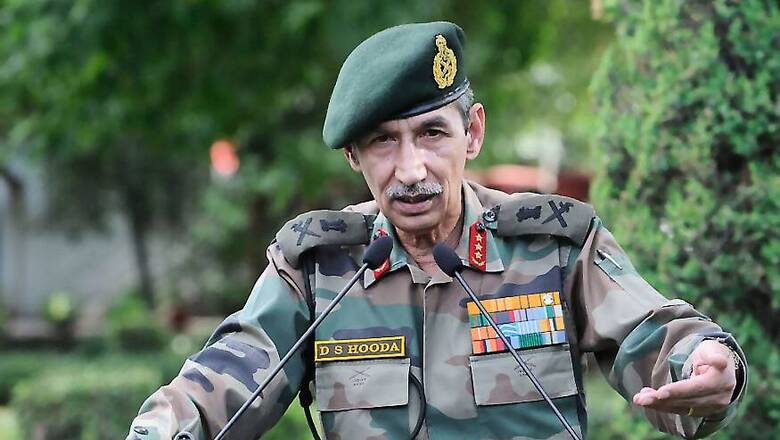
views
New Delhi: Former Northern Army commander (retd) Lt General DS Hooda, in his suggestions to the Congress party, has recommended restoration of talks with Pakistan in a structured manner.
General Hooda, who was last month given the responsibility by the Congress to draft a national security strategy, has also suggested that India should stay away from engaging with the Taliban.
Don’t Rule Out Dialogue With Pakistan
In his 41-page report, the retired Lt General who had led the 2016 surgical strike, suggested that India must not rule out dialogue with Pakistan, adding that the events following the Pulwama attack had taken India’s response to terrorism a notch up.
“However, there is no doubt that military actions carry the risk of escalation and this needs to be factored into our future plans,” he wrote, adding that there is a need for a sustained and long-term strategy to build consistent pressure on Pakistan to desist from supporting terror. Further, pointing at the repercussions of a military response, he said, “growing Indian impatience and a strong response to terror incidents have the potential for escalating to a war-like situation.”
“Diplomacy and economic isolation will play a large part in this strategy…However, talks with Pakistan must be structured, and further progress must be based on visible results. Confidence building measures cannot be pursued if there is a daily flare-up on the borders and infiltration continues. India and Pakistan must also seriously engage in nuclear issues. Nuclear sabre-rattling by Pakistan is a major hindrance to stability in South Asia,” he wrote in the report.
Besides, the report also states that while Pakistan blocks India’s land movement towards the West and that it was imperative for India to find an alternative to bypass Pakistan and the best possible route for that would be Iran. “It is a strategically located country that provides warm water ports for the Central Asian states, westward access to the Indian trade, and entry into Afghanistan via the Chabahar Port. India's engagement with Iran may bring up some differences with the US, but our strategic interests must be clearly explained,” General Hooda wrote.
Offer China Access to Indian Ports
General Hooda mentioned that China’s growing interests in the region was the most significant long-term challenge for India, adding that an unsettled border provides China with the opportunity for selective provocation at a time of their choosing.
“India desires a peaceful relationship with China. However, India’s core interests cannot be compromised, and these interests are the integrity of our borders, our stance on terrorism and our sensitivities in the South Asian and Indian Ocean regions,” he wrote.
He added that China was pursuing alternative road corridors through Pakistan and Myanmar, considering its sensitivity to the flow of imports through the Indian Ocean. “At a future stage, India could offer access to China through Indian ports, though this will entirely depend on China’s willingness to show an understanding of our core interests,” said General Hooda.
He added that while China has not been a traditional naval power, it was now increasing its presence in the Indian Ocean and given the increasing dependence on maritime trade, India and China have much at stake in maintaining peace and harmony, both in the Indian Ocean and the South China Sea. “There is, therefore, a need to facilitate regular dialogue between the two navies wherein sensitive issues could be discussed leading to a bilateral “Framework for an India China Naval Engagement” that is similar to the Border Defence Cooperation Agreement,” the report stated.
The former Northern Army Commander also mentioned how important it was for India to get a permanent seat at global institutions, including the UNSC. Citing the example of China blocking Masood Azhar’s listing in the UNSC Sanctions’ list, he wrote that “unless India is permanently represented in the council as an equal member, its national security interests will not be adequately addressed.”
He further said that the ongoing border talks with China had reached no breakthrough and focus of negotiations must shift to defining the Line of Actual Control (LAC). “This too is a complicated task but if successful, will go a long way in preventing the occurrence of flashpoints like Depsang, Chumar, and Doklam,” he wrote, adding that India must be prepared to strongly contest any violation of its perception of the LAC.
India Must Not Engage With Taliban
Moreover, General Hooda cautioned India to not indulge in peace talks with the Taliban, unlike the US. He said that while India had major strategic interests in a peaceful resolution of the Afghanistan conflict, “such a resolution is looking highly unlikely.”
India has always supported an Afghan-led and Afghan-owned process of peace and reconciliation, but both the US and Russia are currently engaging in direct talks with the Taliban. Despite this, India must not compromise on its position and get drawn into supporting the Taliban,” General Hooda wrote.












Comments
0 comment